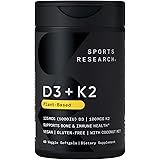Sports Research® Vitamin D3 + K2 w/ Coconut Oil - Vegan Vitamin D 5000iu & Mk7 Vitamin K 100mcg for Bone & Immune Support - Vegan Certified · Non-GMO · Soy Free - 60 Softgels
$23.95 (as of February 1, 2026 21:50 GMT +00:00 - More infoProduct prices and availability are accurate as of the date/time indicated and are subject to change. Any price and availability information displayed on [relevant Amazon Site(s), as applicable] at the time of purchase will apply to the purchase of this product.)Joint Support 101: Glucosamine/Chondroitin vs. Turmeric (Curcumin) — What Recent Reviews Say
Joint comfort is multifactorial: activity, weight management, sleep, and targeted therapies all play a role. Supplements are commonly explored; here’s a balanced summary of two popular approaches and what major guidelines and reviews say.
Evidence at a Glance
Glucosamine/chondroitin: Findings are mixed and depend on formulation. Some reviews suggest modest symptom benefits in certain products (often glucosamine sulfate 1,500 mg/day and chondroitin ~800 mg/day), while major guidelines have recommended against routine use for knee/hip osteoarthritis due to inconsistent benefit. Turmeric/curcumin: Recent systematic reviews suggest significant improvements in knee pain and function versus placebo, with low‑to‑very‑low certainty overall and heterogeneity. More high‑quality trials are needed.
How People Use & Discuss with Clinicians
If you try a supplement, give it adequate time (often 8–12 weeks), choose products with standardized extracts or clearly labeled sulfate forms, and pair with exercise therapy. Track pain/function and reassess. Discuss interactions (e.g., anticoagulants) and safety. For thumb, hand, or other joints, individual responses vary—shared decision‑making with your clinician is key.
Disclaimer: Informational only; not medical advice.
References
- American College of Rheumatology/Arthritis Foundation. 2019 OA Guideline; see also PubMed abstract: 2019 ACR/AF guideline.
- Frontiers in Medicine (2025). Recent advances in knee OA management — summary of supplements evidence.
- BMC Complementary Medicine and Therapies (2025). Network meta‑analysis: turmeric products for knee OA.
- NCCIH. Glucosamine & Chondroitin — What You Need to Know.
Accessed 2025-07-30.



